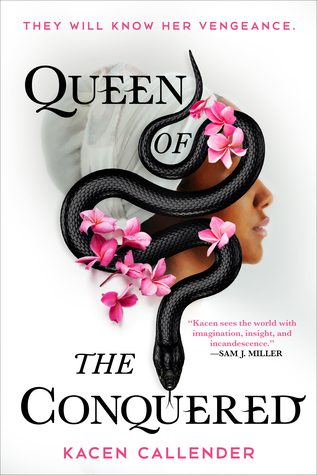Rating: ⭐️⭐️⭐️⭐️💫/5
Synopsis
Sigourney Lund is out for vengeance. After surviving her family’s massacre at the hands of the noble families that rule the islands they inhabit, Sigourney was raised in secret by a sympathetic uncle. Now the head of the family and ruler of her own island, Sigourney is invited to attend the King along with the other island rulers as he announces his successor. She is ambitious: not only does she want to be Queen, but she aims to destroy the remaining rulers and the class system in the process.
As Sigourney attempts to navigate the politics on the Island, things begin to unravel. People are getting murdered, and Sigourney is getting blamed. She does not think she is guilty, but despite using her “kraft” (magic that allows her read minds, control memories, and in some cases direct the actions others) to determine who the killer is, Sigourney is not so sure of anything, anymore. As the Island hierarchy begins to topple, Sigourney sees her own world falling to pieces, as well. The last one standing may well rule the Kingdom… if there is a Kingdom left to rule.
Review
Queen of the Conquered has so many layers – it may be the deepest book I have read this year. To be clear, the main theme of this book is Power: who has it, how they got it; who wants it, how they plan to get it; how it affects people (both the powerful and the powerless). To me, reading the book through this lens helped keep things in perspective.
The fact that the backdrop of the book is colonization and the enslaving of a group of people because of the color of their skin makes this story not only incredibly relevant but also a necessary addition to the SFF portfolio. Many SFF authors include slaves in their stories, but very few of them attack it head on the way Queen of the Conquered does. As a reader, I found the resemblance of colonization in this book to what has been experienced in our real-life world to be quite appropriate. It feels almost like an extension of what we have seen throughout history. As uncomfortable a topic as that is, it is also a theme that I think should be explored more often.
Sigourney is a really interesting MC, and the author does an amazing job of writing her. She comes from a noble family that was wiped out due to fear of their rise in power. Sigourney is hated for the color of her skin and herself feared on account of her “kraft”. From the first scene to the last (literally), the reader is exposed to the angst she endures every day, being at a seat of power in the social order she hates and relegated to following the rules that caste system has created while at the same time scheming to overthrow it. The slaves see her as a traitor, and the other members of the nobility hate her for the color of her skin. She is loved by no one.
Another aspect of Sigourney that makes her a great is MC is how the other characters are portrayed through the lens of her “kraft”. Because she can enter the minds of others, Sigourney spends much of this story in that space reading memories, learning secrets, and hearing their thoughts. This is not only extremely important to the way Sigourney interacts with others, but also with how others interact with the reader. The setting, plot, characters… everything is conveyed to the reader through Sigourney’s perspective, and much of this comes directly from the minds of the other characters as seen by Sigourney. This creates layers on layers of intrigue, and it always left me wondering what I was going to be exposed to next.
It is important to mention that Sigourney is not the only character in the book that uses “kraft”, and not everyone has the exact same power. Since the story is told from Sigourney’s perspective, the reader experiences her “kraft” for much of the story, but the others who use it are important, as well.
The ending of this book wowed me, mostly because I did not see it coming. I should have, and I am actually really embarrassed that I did not. But to me that is part of the genius of this book. Without giving too much away, it is written in such a way that reflects the theme of the book.
In my opinion, there is one major flaw in this story: repetition. Sometimes it repeats a certain memory or a retelling of a character’s storyline, but there are several instances where things are described in detail more than once. I have not decided whether this is a purposeful plot device (ie – because Sigourney is entering the minds of others, she is seeing these memories and thoughts more than once herself, and that is being relayed to the reader), or if this is just the author trying to tell the reader this is important information and repeating it as a reminder. Or both. Either way, I could have done without it, as it would always take me out of the story; a few times I stopped and went back a few pages to see if I was accidentally rereading a chapter. It is a not a huge detriment to the overall quality of the book, but it is noticeable at times.
Overall, I liked Queen of the Conquered very much. Its theme of power, and the way it takes on slavery and colonization (even though in a fantasy setting, it closely resembles our own colonization) is significant. I recommend this book for all fantasy readers, and especially for those looking for something that includes a narrative with a message.





[…] of the Rising is the follow-up to 2019’s Queen of the Conquered (my review of that book is here) and the finale in Kacen Callender’s Islands of Blood and Storm duology. This is a complex […]